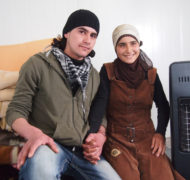A Practical Guide to Meeting the Needs of Refugees and Immigrants - Part Two
Blog / Produced by The High Calling
This guide will help you support the immigrants and refugees transitioning into your community as you prayerfully consider the role God wants you to play in the lives of your new community members.
Making a Distinction
Immigrants are individuals who are leaving their homeland to move to another country for a variety of reasons, including better employment opportunities, education, and health care. Migration from one land to another has been part of the human journey on this planet. In fact, we read about it in Genesis 12:1 when we encounter Abram and Sara and their migration from their homeland.
Refugees are individuals who move to another country because they are in danger of losing their life if they remain in their homeland. We read about this in the Bible from the accounts of Moses and the Israelites (Exodus) to Mary, Joseph, and baby Jesus (Gospel accounts).
Generally, refugees will be resettled through a resettlement agency which assigns skilled individuals to help during the first few months of transition. If you feel a prompting to volunteer in some capacity with a resettlement agency, ask them to provide you with information about the circumstances that led to resettlement. Learn as much as you can about the population. Read through multiple sources for information. Don’t rely on only one news source, even if that source is a religious news organization.
During the First Month
Both immigrants and refugees experience a lot of mixed emotions the first few weeks. Almost every experience is new for them, which makes it somewhat exciting, but also filled with anxiety. The degree of excitement and anxiety will vary depending on the person’s age, educational level, socioeconomic status, ability to communicate, and the circumstances behind their departure from their homeland. Remember, their “normal” is very different from your “normal”; that means their “common sense” can be vastly different from your “common sense.”
Unless they have family bringing them here, immigrants arrive with literally no support. Those who are here without family support often slip through the cracks of society. Volunteering at a local community service agency that serves the immigrants and refugees in your community can help you learn about the specific needs in your community.
Refugees are kept fairly busy during the first few weeks. They will have doctors’ appointments, language classes, and job searches. These events are scheduled fairly quickly (especially if the person already speaks a little bit of English). Your new neighbors will need rides to these appointments. They will need explanations of the purpose of the appointment and how it will help them succeed in their new community.
Listen to what is being said and what is not being said. Pray silently to God, then ask them what they are thinking and feeling. Then listen some more. Don’t ask, “Do you understand?” as they almost always say yes. Instead, ask them to tell you what they understand. Then, if there seems to be confusion, clarify. The film A Good Lie gives some insight into the reality of life as a refugee.
We can be of great service by being cultural interpreters for our new friends.
Feeling Overwhelmed
As weeks go on, the excitement wears off and a depression settles in. There is a sense of loss that each person will need to grieve and a sense of disconnection they will need help overcoming. This is where just spending time with them can be life-giving. As you establish a trusting relationship over the weeks and months of helping to navigate their new culture, make an effort to invite your new friends to activities with your family, to the park, to your kids’ school play or athletic events; just do life with them.
The amount of mail that comes to our homes can be quite daunting for new immigrants and refugees. People new to our culture typically aren’t used to the commercialization we have here. For example, the Publisher’s Clearing House sweepstakes can make a refugee or immigrant believe they have already won. The ads on TV for food and drinks can be quite confusing. I once saw a mom pouring Mountain Dew in her child’s baby bottle. She said the TV told her it was good. I had to explain to her the idea of “advertisement.”
Remember, too, that as your new friends are navigating life during the first year, they will continue to experience new ways of living. Showing up for work, appointments, and taking care of personal possessions is a major issue for most immigrants and refugees. This is due to a variety of differences in national cultural norms.
It’s About Time
In the 21st century, most immigrants and refugees are coming from polychronic nations. Their idea of time and possessions is very different than our monochronic society. In monochronic nations, we value a certain orderliness and sense of there being an appropriate time and place for everything. We plan, sometimes many months ahead of time. We do not value interruptions; we like to concentrate on the job at hand and take time commitments very seriously. Further, monochronic people tend to place great value on private property and are reluctant to be either a lender or a borrower. This is part of a general tendency to follow rules of privacy and consideration as well as adhere to plans, almost religiously.
In polychronic societies, time is continuous, with no particular structure; time is a river that is flowing from the infinite past into the infinite future. People from polychronic societies consider a schedule to be less important than interpersonal relationships. So they will, for example, be glad to stop what they are doing to talk to someone or just sit outside watching someone. They won't care if someone interrupts them by showing up to their home unexpectedly. In fact if they come from a society that also places a high value on hospitality, they will want to include you during their work time or even during their personal time in all facets of their life. They will most likely want to share everything with you. They will most likely want you to interfere on their behalf to others.
This difference in time and possessions can create great problems for some immigrants and refugees who come from polychronic cultures. They’ll need to learn that the U.S. is monochronic—that showing up on time, not wasting time, and valuing time is highly esteemed, and will mean they are showing respect for others.
From Collectivistic to Individualistic
This also means they will have a hard time with being left alone for long periods of time because most of them are coming from collectivistic societies while the U.S. is one of the most individualistic society in the world. You can read more about this in the book, American Ways: Guide for Foreigners Living in the United States.
Lastly, each holiday celebrated in the U.S. is very different for most refugees and immigrants. During the first year, they will need to learn about the holidays and how different people observe them. Help them to know there is no one right way. Help them to know the norms but don’t lock them into doing things your way.
Navigating Language Challenges
After the first year, your new friends will begin to learn to navigate different types of challenges. By now they have learned a few things about life in America. They have learned the various holidays and their meanings. They hopefully are learning the language more and more.
As a general rule, the older the person, the harder it is for them to learn a new language. Also, the more traumatic the events a person has experienced, the harder it is to retain what has been learned. Lastly, if a person is illiterate in their own language, this will exponentially increase the challenges they encounter in learning a new language. All the same, encourage and support them. Learn a few words in their language to help them to know that you are willing to try and they can try too. Some will never learn more than a few words.
This is the season where challenges can begin to take place in relation to family dynamics. Children are going to school and learning and adapting at a much more rapid pace than their parents. If the family dynamics aren’t strong, the parents may push their children away because they are seeing them become “too Americanized.” One of the best things you can do is to never use a child as an interpreter for the parents. If children are used as interpreters, they will feel more powerful, while the parents feel powerless. This reverses the power dynamics in the family and can have a terrible impact on the parents’ relationship with their children.
Family Life
Support the children by encouraging them to connect with their parents and to know that it is normal to feel a sense of disconnect. Support the parents by helping them connect with their children and recognize that the changes need not mean total loss of family. Affirm that what they are feeling is natural. This is when children begin to create a third culture because the culture at home and the culture at school/friends’ homes seem to be vastly different. In their book Migration, Diversity, and Education: Beyond Third Culture Kids, authors Saija Benjamin and Fred Dervin share the results of their research on “third culture children” that helps readers better understand how to navigate life with their new neighbors.
The immigrants and refugees who have family still in their home country will be working to either reunite and/or send funds for their family. This can create a big burden for them. Don’t tell them they don’t have to do that. They may ask you to help them find their family member in a refugee camp or fill out forms for various immigration and naturalization issues.
The greater the challenge a person faces as they attempt to settle into a new culture, the greater the support that person needs. In fact, if there isn’t enough support, the person can become calloused and cold. On the other hand, if there’s great support and no challenge, the person settles into apathy. Yet when the support and challenge are balanced, the possibilities for that person are endless.
While technological advancements allow us to easily move between locations physically, it can take decades for our hearts and minds to navigate that same distance. Cognitively and emotionally, it takes time to catch up and adjust to our new surroundings. And the older we are, the longer it will take to make the adjustment. For some, the heart and mind never catch up. Most people do adjust, but for most it happens with great difficulty.
Remember, the greatest gift you can give an immigrant or refugee family is yourself.





